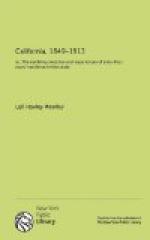“Law and Order” Party.
On the 2nd of June, 1856, Governor J. Neely Johnson having declared the city of San Francisco to be in a state of insurrection, issued orders to Wm. T. Sherman to enroll as militia, companies of 150 men of the highest standard and to have them report to him, Sherman, for duty. The response was light and the order looked upon as a joke and little or no stock taken in it. So on the 7th Sherman tendered his resignation as Major General, claiming that no plan of action could be determined upon between himself and the Governor. The action taken by the Governor in this move was by virtue of the constitution of the State, his duty to enforce the execution of the laws, he claiming that the Vigilance Committee had no right to arm and act without respect to the State laws.
Terry and Hopkins Affair.
On the 2nd of June, 1856, the city was in great excitement at an attempt by David S. Terry to stab Sterling A. Hopkins, a member of the Committee. Terry was one of the judges of the Supreme Court. Hopkins and a posse were arresting one Rube Maloney when set upon by Terry. Hopkins was taken to Engine House No. 12 where Dr. R. Beverley Cole examined and cared for his wound which was four inches deep and caused considerable hemorrhage. The blade struck Hopkins near the collar bone and severed parts of the left carotid artery and penetrated the gullet. Terry and Maloney at once fled to the armory of the “Law and Order Party” on the corner of Jackson and Dupont streets. The alarm was at once sounded on the bell at Fort Gunnybags and in less than fifteen minutes armed details were dispatched to and surrounded the headquarters of the “Law and Order Party” where Terry had taken refuge, and in less than half an hour had complete control of the situation, and by 4:15 o’clock in the afternoon Terry and Maloney and the others found there had been taken to the Committee rooms as well as the arms (a stand of 300, muskets) and ammunition. About 150 “Law and Order” men together with about 250 muskets were also taken from the California Exchange. Several other places were raided and stripped of their stands of arms.
Terry was held by the Vigilance Committee until August 7th and charged with attempt to murder. Mr. Hopkins recovered and Terry, after a fair and impartial trial, was discharged from custody, though many were dissatisfied at his dismissal and claimed that he should have been held. Terry was requested to resign and resigned his position as judge of the Supreme Court.
Duel Between Terry and Broderick.
In 1859 Judge Terry had an altercation with United States Senator Daniel C. Broderick which caused the former to challenge the latter to a duel. This duel which was with pistols was fought September 13, 1859, near Lake Merced, near the present site of the Ocean House. It resulted in Broderick’s death, whose last words were, “They killed me because I was opposed to a corrupt administration,




